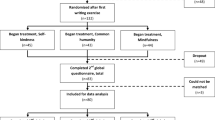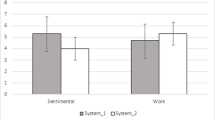Abstract
Two studies were conducted to assess the relationship between an individual's self-described motivation for being a help-provider (i.e., a lawyer in Study 1 and a physi-cian in Study 2) and college undergraduates' perceptions of, and desire to seek assis-tance from, that help-provider. The major findings were incongruent with the notion inferred from the helping literature that altruistically motivated help-providers would be consistently evaluated more favorably than, and preferred over, egoistically moti-vated help-providers. Specifically, whereas the other-oriented help-providers were rated as more likable, honest, and less devious than the self-oriented help-providers, the self-oriented help-providers were rated as more ambitious, competent, and as earning more money than the other-oriented help-providers. Moreover, although the participants' “desire to hire” a particular help-provider was found to be associated with: (1) their perceptions of the help-provider's characteristics (Studies 1 and 2), (2) their own self-reported characteristics (Study 1), and (3) their anticipated affective state prior to seeking assistance (Studies 1 and 2), no clear relation was found in either study between the help-provider's motivation and the participants' desire to seek assistance from that help-provider. In contrast to the ambivalence demonstrated in response to the altruistically and egoistically motivated professional help-providers in Studies 1 and 2, participants in a preliminary study of perceptions of “everyday” helpers demonstrated a clear preference for altruistically motivated assistance (al-though these participants' evaluations were found to be influenced by the closeness of the relationship between the helper and recipient, the type of help provided, the participants' gender, and the gender of the helper-recipient dyad). Considered to-gether, the pattern of results suggests the broad range of situational and individual difference variables that may affect perceptions of, and reactions to, self-oriented and other-oriented help-providers.
Similar content being viewed by others
References
Barnett, M. A. (1988). Reasons for not wanting help: Categories and developmental differences. Journal of Genetic Psychology, 149, 127–129.
Bart, P. (1994). Superstar, esq.: Legal eagles fly like stars. Variety, 356 (October 3), 6, 26.
Basow, S. A. (1992). Gender: Stereotypes and roles (3rd Ed.). Pacific Grove, CA: Brooks/Cole.
Batson, C. D. (1990). How social an animal?: The human capacity for caring. American Psychologist, 45, 336–346.
Batson, C. D. (1991). The altruism question: Towarda social-psychological answer. Hillsdale, NJ: Erlbaum.
Batson, C. D. (1995). Prosocial motivation: Why do we help others? In A. Tesser (Ed.), Advanced social psychology (pp. 333–381). New York: McGraw-Hill.
Baumeister, R. F. (1995). Self and identity: An introduction. In A. Tesser (Ed.), Advanced social psychology (pp. 51–97). New York: McGraw-Hill.
Bern, S. L. (1974). The measurement of psychological androgyny. Journal of Consulting and Clinical Psychology, 42, 155–162.
Campbell, D. T. (1975). On the conflicts between biological and social evolution and between psychology and moral tradition. American Psychologist, 30,1103–1126.
Caplan, L. (1995). Who ya gonna call? 1-800-sue me. Newsweek, 125 (March 20), 36.
Carlo, G., Eisenberg, N., Troyer, D., Switzer, G., and Speer, A. L. (1991). The altruistic personality: In what contexts is it apparent? Journal of Personality and Social Psychology, 61,450–458.
Clark, M. S. (1983). Some implications of close social bonds for help seeking. In B. M. DePaulo, A. Nadler, and J. D. Fisher (Eds.), New directions in helping: Vol. 2. Help seeking (pp. 205–233). New York: Academic Press.
Davis, M. H. (1983). Measuring individual differences in empathy: Evidence for a multidimensional approach. Journal of Personality and Social Psychology, 44,113–126.
Eisenberg, N. (1982). The development of reasoning regarding prosocial behavior. In N. Eisenberg (Ed.), The development of prosocial behavior (pp. 219–250). New York: Academic Press.
Eisenberg, N. (1986). Altruistic emotion, cognition, and behavior. Hillsdale, NJ: Erlbaum.
Eisenberg, N., Lennon, R., and Roth, K. (1983). Prosocial development: A longitudinal study. Developmental Psychology, 19, 846–855.
Eisenberg, N., Miller, P. A., Shell, R., McNalley, S., and Shea, C. (1991). Prosocial development in adolescence: A longitudinal study. Developmental Psychology, 27, 849–857.
Fotheringham, A. (1994). The law according to the chequebook. Maclean's, 107 (October 24), 60.
Gleick, E. (1996). Look who's talking. Time, 147 (April 8), 41–42.
Hoffman, M. L. (1982). Development of prosocial motivation: Empathy and guilt. In N. Eisenberg (Ed.), The development of prosocial behavior (pp. 218–231). New York: Academic Press.
Hoffman, M. L. (1989). Empathy and prosocial activism. In N. Eisenberg, J. Reykowski, and E. Staub (Eds.), Social and moral values (pp. 65–86). Hillsdale, NJ: Erlbaum.
Hume, D. (1963). A treatise of human nature. In V. C. Chappell(Ed.), The philosophy of David Hume (pp. 11–312). New York: Modern Library (Original work published 1739).
Kaplan, D. A. (1994). Three for the defense. Newsweek, 124 (July 11), 26–27.
Krebs, D. L., & Van Hesteren, F. (1994). The development of altruism: Toward an integrative model. Developmental Review, 14, 103–158.
Markus, H. R., and Kitayama, S. (1991). Culture and the self: Implications for cognition, emotion, and motivation. Psychological Review, 98,224–253.
Nadler, A. (1991). Help-seeking behavior: Psychological costs and instrumental benefits. In M. S. Clark (Ed.), Prosocial behavior (pp. 290–311). Newbury Park, CA: Sage.
Phares, E. J., & Erskine, N. (1984). The measurement of selfism. Educational and Psychological Measurement, 44, 597–608.
Samuelson, R. J. (1992). I am a big lawyer basher. Newsweek, 119 (April 27), 62.
Shaffer, D. (1994). Social and personality development (3rd Ed.). Pacific Grove, CA: Brooks/Cole.
Smith, A. (1966). The theory of moral sentiments. New York: A. M. Kelley(Original work published 1759).
Wallach, M. A., and Wallach, L. (1983). Psychology's sanction for selfishness: The error of egoism in theory and therapy. San Francisco, CA: W. H. Freeman.
Author information
Authors and Affiliations
Rights and permissions
About this article
Cite this article
Barnett, M.A., Vitaglione, G.D., Bartel, J.S. et al. Perceptions of self-oriented and other-oriented help-providers. Curr Psychol 17, 170–187 (1998). https://doi.org/10.1007/s12144-998-1004-9
Accepted:
Issue Date:
DOI: https://doi.org/10.1007/s12144-998-1004-9




